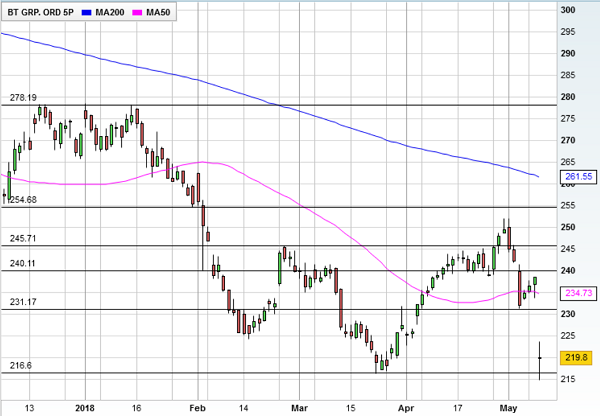Are BT shares too cheap after diving 10%?
10th May 2018 11:29
by Lee Wild from interactive investor
Not for the first time, the source of a market rally can be traced back to Donald Trump. Of a long list of controversial policies, only tariffs and the threat of a trade war with China ever took steam out of the market. This time it's the President's widely-condemned decision to scrap a breakthrough nuclear accord with Iran that's stuck a rocket under oil stocks.
just hit a new high and shares now trade near their best since the Deepwater Horizon disaster in 2010. Despite a two-week window to save the Iran deal, a resolution seems almost impossible. Brent crude could easily top $80 for the first time since 2014 as US sanctions bite and the threat of military confrontation between Iran, Israel and Saudi Arabia increases.
One of the most impressive stockmarket rebounds of recent times has found a new lease of life. The is now up 12% since the end of March and currently trades 150 points from a record high, something unthinkable just six weeks ago.
Sterling's rapid pullback from April's pre-referendum levels has paused, but the pound remains vulnerable amid political instability here both internally and between the MPs and peers. Further sterling weakness would certainly underpin optimism in London-listed overseas earners.
Weak GDP data and receding inflation threat will likely force Mark Carney to confirm an embarrassing u-turn and keep UK interest rates on hold at the Bank of England's May meeting. The hot money's on guidance for a first increase since November shifting out to August in a bid by the Bank to maintain some credibility.
There seems little desperate economic need to hike, but savers at least will be praying policymakers continue the path to more normal borrowing costs before the window closes before Brexit becomes reality next year.
It's a big day for popular stocks like , and , which all issued trading statements this morning, but troubled telecoms operator is of particular interest.
BT shares began a slow and painful decline two years ago, more than halving in value to make a five-year low last month. Part of the reason for BT's decline is the inevitable heavy spending needed to upgrade the fibre network with potentially no incremental return. But it's finally taken action which it clearly believes will signal a change in fortunes.
Cutting 13,000 admin and middle management jobs and hiring 6,000 staff in more relevant roles, including engineers to accelerate rollout of fibre broadband, is common sense. Finding £1.5 billion of cost cuts and moving out of its expensive London HQ to focus on 30 fit-for-purpose hubs, is the kind of action BT shareholders have wanted to see for years.

Source: interactive investor Past performance is not a guide to future performance
Too long a bloated, lumbering beast, BT's recognition that it must become a 'lean and agile' organisation is long-overdue. It is both dramatic and far-reaching, yet both sensible and critical if the business is to compete with rivals who saw the future of a rapidly changing industry much quicker than BT.
An uninspiring outlook for 2018/19 implies a cut to consensus estimates, with BT pencilling in a 2% cut to full-year underlying revenue and adjusted cash profit of £7.3-£7.4 billion. In 2017/18, BT made £7.5 billion on revenue down 1%.
There's disappointment around the pension deficit too, with a triennial deficit agreed at £11.3 billion and, while there is relief that cost cuts will bankroll the dividend "for the next two years", there will be no increase in the payout given "the outlook for earnings and cash flow". BT pays a final dividend of 10.55p this time, leaving the full-year total unchanged at 15.4p.
Investors need some convincing if the grim response to the strategy, results and pension review is anything to go by.
BT shares were down as much as 10% early Thursday at prices not seen since October 2012. However, they remain cheap on most valuation models and a dividend of yield of around 6.5% is compensation for risk involved in making Gavin Patterson's grand plan work.
For the record, UBS analyst Polo Tang still rates BT shares a 'buy' with 310p price target.
These articles are provided for information purposes only. Occasionally, an opinion about whether to buy or sell a specific investment may be provided by third parties. The content is not intended to be a personal recommendation to buy or sell any financial instrument or product, or to adopt any investment strategy as it is not provided based on an assessment of your investing knowledge and experience, your financial situation or your investment objectives. The value of your investments, and the income derived from them, may go down as well as up. You may not get back all the money that you invest. The investments referred to in this article may not be suitable for all investors, and if in doubt, an investor should seek advice from a qualified investment adviser.
Full performance can be found on the company or index summary page on the interactive investor website. Simply click on the company's or index name highlighted in the article.